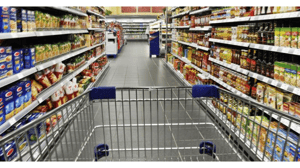FMI shares its plans to make food more accessible in underserved communities
Chief public policy officer and senior vice president of government and public affairs said FMI has recommended that the federal government modernize its food assistance programs, like SNAP.
January 24, 2023

FMI—The Food Industry Association wants to make it easier for everyone to access and afford food, and says the organization has already made investments in improving food accessibility. But their work continues. Jennifer Hatcher, FMI’s chief public policy officer and senior vice president of government and public affairs, spoke with WGB about FMI’s plans to improve food access in underserved communities, including the industry association's goal to donate up to two billion meals this year, and its stance on modernizing the Supplemental Nutrition Assistance Program.
WGB: How does FMI plan to improve food access in underserved communities?
Jennifer Hatcher: The food industry and government can work together to end hunger by making it easier for everyone—including urban, suburban, rural and tribal communities—to access and afford food. As one of the business and social centerpieces in local communities, our industry is uniquely positioned to make a meaningful impact on improving food access and affordability, integrating nutrition and health, and empowering all consumers to make and have access to healthy choices—whether in the grocery store, online or in the community.
We have urged the federal government to remove regulatory barriers for food recovery, and provide incentives for companies supporting food recovery and food donation programs. FMI has also recommended that the federal government modernize its food assistance programs, like the Supplemental Nutrition Assistance Program (SNAP) and Special Supplemental Nutrition Program for Women, Infants and Children (WIC). USDA should prioritize the Mobile Payment Pilot for SNAP, which would allow SNAP participants to utilize their EBT card on a mobile device to make SNAP purchases at the point-of-sale, and should work with the food industry to integrate this capability into retail technology.
What programs will FMI be investing in?
FMI members are proud to be the largest source of private donations to Feeding America’s food bank network—in 2021 alone, food retailers, wholesalers and product suppliers donated 1.7 billion meals. As part of our continued support of our nation’s food banks, FMI has set bold, measurable commitments to increase food donations. In 2023, our industry is pledging to donate up to two billion meals—more meals than ever before.
FMI and its members are also focused on piloting and implementing Food as Medicine programs—a philosophy where food and nutrition aids individuals through interventions that support health and well-being.
FMI is investing in resources our members can leverage to serve their communities with affordable and nutritious meals. For example, we have developed toolkits to educate customers on how to enroll in and use food assistance programs.

Not only does FMI’s toolkits educate customers on how to enroll in and use food assistance programs and access food banks, they also provide ideas for ingredient substitutions and affordable meal-time solutions. / Photo courtesy: FMI
During “Family Meals Month,” FMI invested in a robust campaign to educate shoppers on the health and nutrition benefits of family meals and provided tools, resources, and tips for families to plan their meals.
How will grocers be involved with FMI’s food access plans?
FMI’s members have already made significant investments in improving food access in their communities through innovative approaches such as mobile food pantries and refrigerated grocery delivery vehicles.
One FMI retail member recently partnered with a mobile app that enables customers to access fresh foods nearing their best buy date at significantly reduced prices. For grocery retailers, the program helps reduce food waste while enabling customers to access meat, dairy, fresh produce and more at prices up to 50% off. To support consumers in extending the shelf life of the foods they buy, FMI partnered with the U.S. Department of Agriculture (USDA) and Cornell University’s Department of Food Science to develop a mobile app and online database called FoodKeeper. Customers receive instant notifications on food recalls and gain access to food storage timelines for over 500 refrigerator, freezer and pantry items.
Another one of FMI’s retail members works with Interfaith Food Shuttle programs to support low-income families living in food deserts without adequate access to nutritious food. The Food Shuttle recovers and distributes more than 8 million pounds of food per year, and teaches skills for self-sufficiency, including culinary job skills, shopping, cooking healthy on a budget and how to grow food. Almost 5,000 children receive nutritious meals through BackPack Buddies, school pantries and their food truck.

Thousands of children receive nutritious meals through BackPack Buddies. Each BackPack Buddies bag includes enough food to feed one elementary school child four meals over a weekend, according to Interfaith Food Shuttle. / Photo courtesy: Interfaith Food Shuttle
All our members recognize that the food industry plays a key role in hunger, nutrition, and health with the grocery store as a destination for health and well-being. Our industry is committed to continuing to collaborate with local and federal agencies to improve our nation’s access to nutritious meals.
About the Author
You May Also Like




